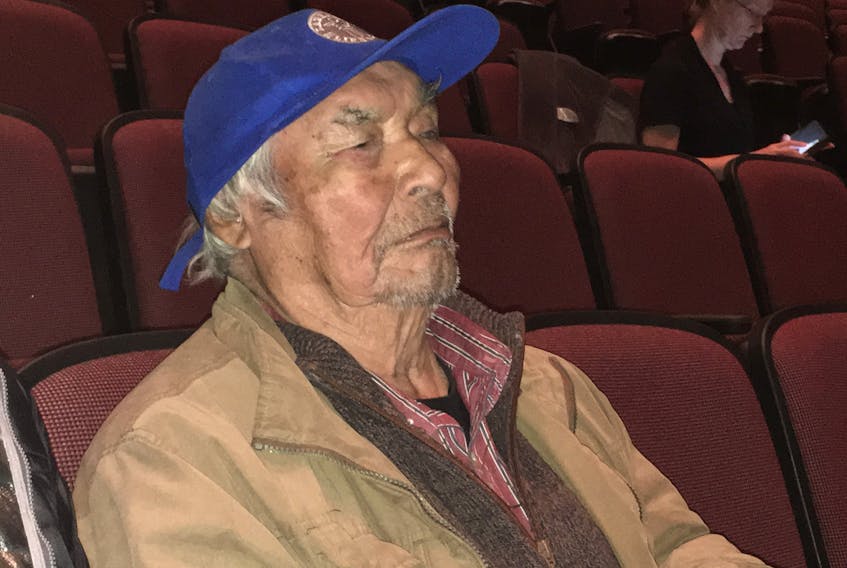HAPPY VALLEY-GOOSE BAY – Testifying at the Muskrat Falls Inquiry, Sebastian Penunsi spoke for the Innu Nation about the use of the Churchill River as a transit route, as people travelled and lived on the land, and its importance to hunting, trapping and fishing.
Penunsi was born in Labrador in 1930. During his testimony Tuesday morning, he spoke about growing up on the land, making visits with family into the area that is now Sheshatshiu, in order to trade furs with the Hudson’s Bay Company for supplemental supplies like sugar and lard, before heading out again.
The elder spoke on the record in Innu-Aimun, with questions and responses translated to English.
The morning of the second day of the inquiry hearings was focused on description of the historical use of the lower Churchill River, the area of the Muskrat Falls hydro dam, and the area downstream. Penunsi was asked about the site of the dam and spoke about the more significant marker for the people of the Innu Nation being the “sacred mountain,” rather than the falls beside it (what was known as Muskrat Falls is an area along the river of what might better be described as high rapids than a single waterfall).
“He was saying the river was used by many Innu people going in and out of the country,” the translator said. The area beside the mountain was a common portage site.
RELATED STORIES
Hydro projects usually more expensive than originally estimated: expert
Muskrat Falls Inquiry hearings start in Labrador
When asked about any Inuit -rather than Innu - use of what is now the area of the Muskrat Falls dam site, Penunsi said he did not know of Inuit people using site of falls in all his years. He did testify to being on the land and encountering other Innu people, being people he would more closely associate with the area that is now the Quebec north shore, who had travelled toward the Churchill River to trade.

Former Nunatsiavut minister of Lands and Natural Resources Carl McLean preceded Penunsi on the stand. He spoke mainly to historical Inuit activity, particularly South of the dam, to the river’s end and in the large estuary at the end of the Churchill River known as Lake Melville.
“They’re certainly inextricably linked, the river and Lake Melville,” he said, reiterating the water as a transit route even today.
“It’s the highway,” he said, mentioning as well the importance of the flow of fresh water from the Churchill River into the estuary, for the health of local wildlife.
McLean offered some history of travel, hunting and particularly trapping along the river by the Inuit, but on present day concerns reiterated the Inuit of Nunatsiavut have been concerned with the Muskrat Falls dam project from the start, given methylmercury production associated with hydroelectric dams and what it will mean for the supply of food, including fish, birds and seal.
He noted the Nunatsiavut government has a settled land claim and the Labrador-Inuit Settlement Area reaches into the eastern side of Lake Melville.
The testimony on the day has often repeated and re-established points made in the early reviews of the Muskrat Falls project, including during the work of the provincial-federal environmental review panel.
The session continued with appearances by Chief Jean-Charles Piétacho, for the Conseil des Innu Ekuanitshit, and NunatuKavut Community Council president Todd Russell.

Piétacho, also with a translator, reiterated during his testimony that he and his people do not recognize the Quebec-Labrador border. He said the Innu people he represents and their ancestors would travel to the area of what is now Labrador and the area of the project. As with Penunsi, he spoke about living off the land and the importance of country foods.
Russell echoed comments on the significance of the river for transportation and of Lake Melville for food, saying the relationship continues into modern times. “There’s a very deep connection,” he said, describing use of the Muskrat Falls project area.
Russell also said the developments of the Churchill Falls hydroelectric project and the more recent Muskrat Falls hydro project, “the way they were done,” created a sense of separation of the people from the project areas. He mentioned the creation of reservoirs for the hydro dams, the affect on the availability of the land, and affect on wildlife.
The witnesses, save Penunsi, are expected to be recalled in October, as the inquiry looks to more specifically address Indigenous consultation and the Muskrat Falls project.









